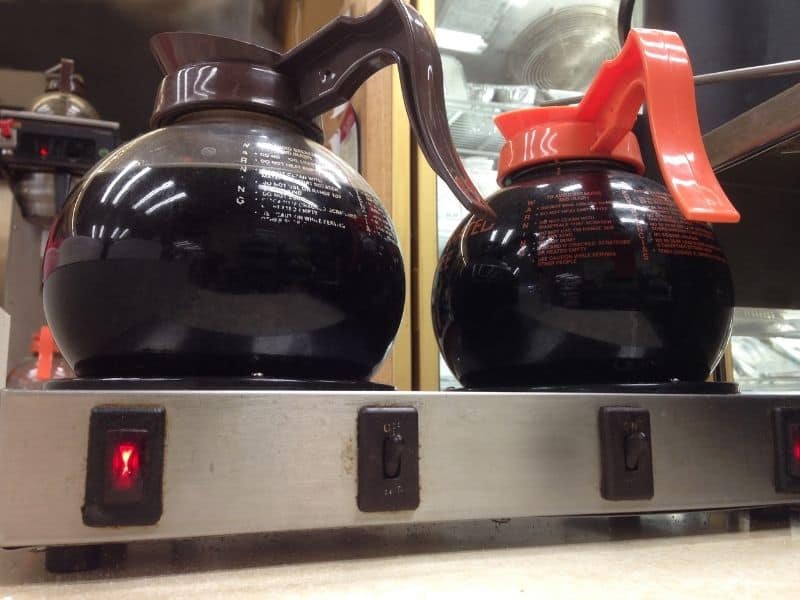Oxygen, something we cannot survive without, is coffee’s biggest enemy. Like rust on a car, the combination of oxygen and moisture gives a corrosive effect.
Of course, coffee beans don’t go rusty, but when exposed to the air, the quality deteriorates very quickly. The moisture in the beans reacts with the oxygen and the bean starts to break down, losing its flavor and freshness.
So, in this article, we’re going to answer the question, can old coffee make you sick?
Let’s get straight into it.
Can old coffee make you sick?
Yes and no. As mentioned above, when coffee beans are exposed to air, the quality merely deteriorates very quickly.
The moisture in the beans reacts with the oxygen and the bean starts to break down, losing its flavor and freshness.
That doesn’t mean you will get sick from using stale beans, it just means that it won’t taste as good as fresh roast, fresh ground. In fact, stale beans will not taste very good at all.
It’s a little different with brewed coffee. Left too long (and I mean weeks, not hours) it can grow mold and start to ferment, and that will definitely not be good for you.
Does coffee go bad?
We often think that food companies put expiry dates on some products because, well, they have to put something. That is almost the case with coffee beans, they are usually good well past their given expiry date.
In fact, because they are dry, packaged food, they cannot themselves go bad – they won’t sprout like potatoes or grow mold like an old lemon. They just won’t taste as good as freshly roasted beans.
However, if they get wet in storage, or get little pantry bugs crawling through them, discard them immediately, they will be good for nothing.
But stored in a dry, airtight container in a cool dark place, they will last for months and months.
It’s a little different with ground coffee. As long as the original packaging is unopened they will last long after their official expiry date with a degree of freshness.
Once the pack is opened, however, and the grounds are exposed to the air, it becomes a race against time and oxygen to get a good, drinkable cup of coffee.
Rancid coffee symptoms
Healthy, fresh coffee beans have a natural shine from oils and moisture, and it’s the oils that mainly give the wonderful aroma and flavor when brewed. When beans are very old or have been stored incorrectly for a while, they lose the shine and become dull. The oil and moisture are gone, and the beans are stale and flat.
The first symptom is smell. A fresh-roasted coffee bean smells like – well, like coffee. A dull, stale bean has been said to smell like a dirty ashtray. This also applies to both ground coffee and instant coffee.
It also changes in appearance. Freshly roasted coffee beans are dark in color. In addition to losing its shine, an old bean will appear lighter.
The final test is the taste. If you brew some old coffee and find it has a very sour, very bitter taste, yep, it’s rancid.

Can you drink old brewed coffee?
Most of us who eat in diners for breakfast or lunch will, at some point, drink old brewed coffee. In theory, when coffee is brewed it has a shelf life of around 30 minutes before it goes stale.
In a good business operation, any coffee in the pot after that time should be thrown out and a fresh brew put on. Does that happen every time? Definitely not.
As soon as you lift the cup, smell the aroma, and take the first sip, you just know it has been sitting on the warmer a bit too long. But it is still coffee – like pizza, when it’s good it’s really good. When it’s bad it’s still good!
In your home, you can actually keep brewed coffee for a couple of days.
Just let it cool down and then store it in the fridge in an airtight container, it will be ok to drink.
Cold-brewed coffee is the same. In the same conditions, it can have a shelf life of around five days.
Can burnt coffee make you sick?
There are two ways coffee can be burnt.
Firstly, the obvious way, the beans can be over-roasted.
Roasting the beans until burned gives them a charcoal appearance. They lose all their oils and moisture, and if used to make coffee they will be bitter and have no flavor. The best use for them then is to add to your garden as fertilizer.
Secondly, “burning” is a technical term used by baristas to describe coffee grounds that are over-extracted, meaning the timing for water to pour through the coffee grounds in an espresso machine is too long.
The standard time for a single shot should be no more than between 20 and 30 seconds. Any longer and the coffee will taste weak and bitter, and this is known as “burnt”.
Of course, being coffee, it is still safe to drink, but why would you want to?
Can stale coffee give you diarrhea?
Coffee is well known as a diuretic and a laxative, but rarely to the point where it causes an issue and this also applies to stale coffee.
The worst that will happen is that you have a bad flavor in your mouth for a while. In fact, studies show that there is no direct link between coffee and problems with the digestive system.
Most of the time diarrhea is caused by some sort of infection in the body – viral, bacterial, or parasitic – or sometimes as a reaction to a medication.
It is well known that too much coffee can increase the amount of gastric acid the stomach produces, and this can lead to stomach cramps or heartburn, but if you have diarrhea after drinking coffee you need to look elsewhere because the answer will not be in your cup.
Conclusion
Generally speaking, coffee beans that have been sitting around unopened should be fine, but once you break the seal and expose them to air, they will go stale.
Brewed coffee that has been left on a hot plate too long or even in your home for several hours will eventually go stale. You can store brewed coffee in the fridge for a few days, but the flavor will inevitably suffer.
Cold-brewed coffee can last around five days if kept in an airtight container.
And if you do happen to get the runs, then it’s best to look beyond just your coffee as it is probably not the main culprit.
Hopefully, this article has taken some of the fears out of old coffee, but if you are still uncertain then just don’t drink it. It tastes better fresh anyway.
Related:

